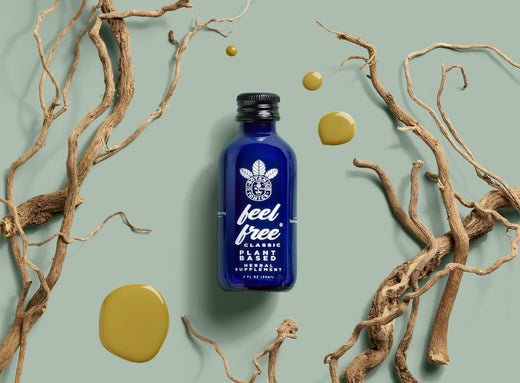Kava offers long-lasting concentration and relaxation benefits, helping you power through the work day or enjoy a fun, worry-free night with friends.
Like most plant-based products, however, kava also comes with a “use by” date.
Kava doesn’t “go bad” like milk left out on the counter, but it does lose potency over time. Since most people use kava for its natural cognitive and social boosts, knowing how to store kava effectively—and when to replace your supply—will ensure you always achieve your desired results.
Learn more about kava’s shelf life from Botanic Tonics, your experts in plant-based wellness.
Shelf Life of Kava

Does kava expire? Not in the same way as most foods and beverages do.
Kava is considered an herbal remedy; it comes from the roots of Piper methysticum, aka the kava kava plant.[1] Like other herbs, kava loses potency over time, reducing its strength and effectiveness.
Kava generally lasts for a year or more in storage, but several factors can impact its shelf life—for better or worse.
Factors Affecting Kava Expiration
But its green origins aren’t the only reason for kava’s expiration date. Some factors can speed up the process (or carefully delay it).
Storage Conditions
Kava’s shelf life largely depends on which shelf you leave it on.
Kava root, powder, capsules, and unopened kava tonic all require a storage space that is:
- Dark
- Dry
- Cool
Sunny, moist, or warm conditions can threaten the quality and effectiveness of your kava. Many experts also recommend storing kava in sealed or airtight containers. Oxygen and moisture exposure can cause kava to degrade faster, reducing its potency. Proper storage is key to keeping your kava supplement potent and ready to use.
Kava Form
Kava comes in several unique forms—powder, root, tonics, and capsules—just another one of its many benefits. Some users enjoy kava’s strong, distinct taste and choose kava as teas and tonics. Others want to feel focused without the flavor, preferring to take concentrated capsules instead.
All forms of kava can enhance your productivity and relaxation. The shelf lives of each differ, however. Here’s what you can expect:
- Kava powder and root – Like most herbs, kava may last in these forms for one to three years. Storage conditions heavily impact their longevity. [2]
- Kava capsules and herbal supplements – Many capsules, such as our feel free kava capsules, last for 18 months from the manufacture date listed on the label.
- Kava tonics – Most liquid forms of kava also last for 12 months from the manufacture date when stored unopened. Once you open the bottle, tonics will stay good for 48 hours in the refrigerator.
How to Tell if Kava Has Expired
Kava doesn’t spoil like milk and meat. It won’t develop a funky smell or grow green and fuzzy. So, how do you know when it’s time to toss it?
Your kava product’s “use by” date will offer you the strongest indication of when it has passed its prime. If that date hasn’t passed, but you suspect something might be off, you can use a few different tests to guess if it’s expired.
Since kava is an herb, you can test the potency of kava powder and root similarly to how you’d test oregano or rosemary. Consider its [2]:
- Appearance – If your kava has faded or lost its original color, it may have also lost its potency.
- Aroma – If your kava no longer gives off a strong scent, you can assume its taste, as well as its calming effects, have degraded.
Consuming expired kava likely will not harm you or cause any adverse effects, but you won’t experience the same powerful benefits as fresh, potent kava. And if you ever see mold growing on your kava or in its storage container, always throw it away.
Tips to Extend Kava’s Shelf Life
You can store kava for a long time according to the label, but its potency depends most on how you store it. Here are a few simple and effective storage strategies you can use to best preserve your kava supply:
- Store kava in a cool, dark place – Consider storing your kava supply in the pantry or a kitchen cabinet at room temperature (between 65 and 75°F). Kava tonics also do well in the fridge—and the chill produces the best flavor.
- Avoid humidity – You may feel tempted to refrigerate kava powder or root to maximize shelf life as you would with veggies, for example, but the moisture in the fridge may actually degrade it faster. To prevent humidity exposure, store your kava in a vacuum-sealed or airtight container.
- Refrigerate kava tonics after opening – Our feel free tonics contain two servings per bottle. After you enjoy your first focus-enhancing serving, put the bottle in the fridge to keep it cool for the next time you need an extra boost. For the best quality, make sure to finish a bottle within 48 hours after opening.
Find the Freshest Kava at feel free

Looking for a trustworthy source of fresh, potent kava? We’ve got you covered.
Botanic Tonics offers plant-based focus and relaxation driven by the power of kava root. Our feel free classic tonic and feel free capsules have been rigorously tested to ensure they only contain clean and effective ingredients, which maximize the long-lasting, mind-body boost.
Browse our selection now and discover a new way to unwind and lock in with natural kava.
As you explore how to best enjoy kava, consider this elevated blend.

feel free Kava Maté pairs noble kava root with yerba mate for smooth, sustained energy and a grounded mental state—all in one shelf-stable tonic.*
View the tonic →
Sources:
- Medical News Today. What is kava kava? https://www.medicalnewstoday.com/articles/324015
- Healthline. Do Spices Expire? Shelf Life and When to Toss Them. https://www.healthline.com/nutrition/do-spices-expire















